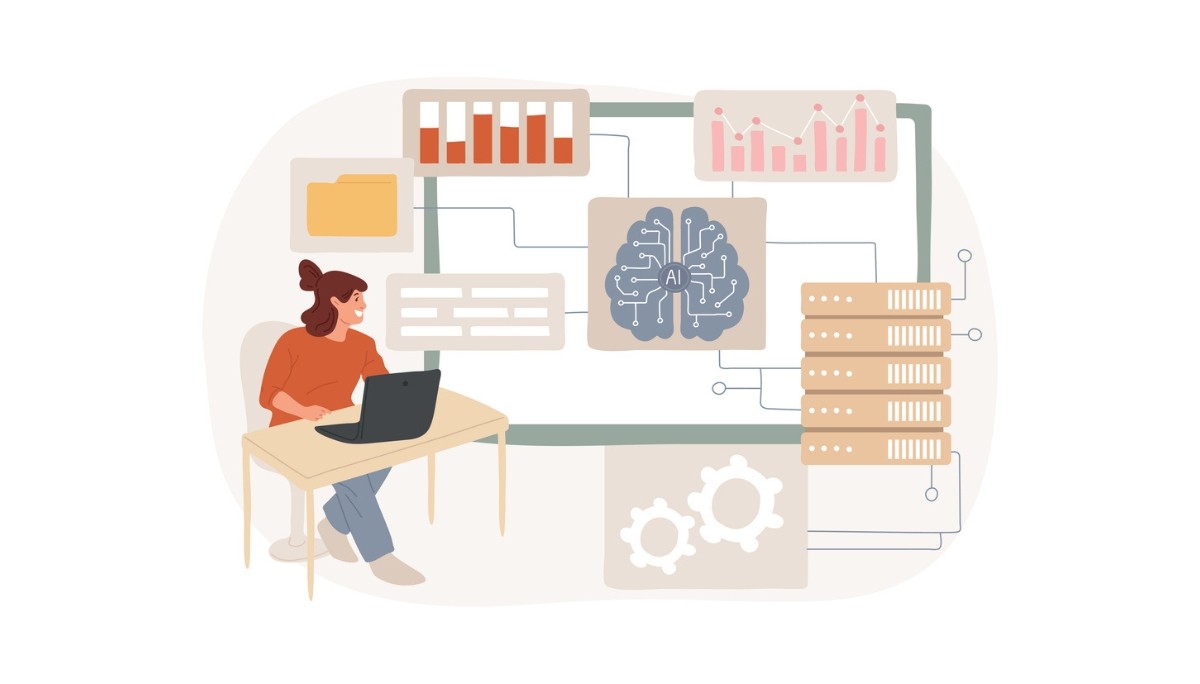Self Appraisal Examples to Use in Your Next Performance Evaluation
By
Ethan Fahey
•
Sep 19, 2025
Searching for self-review examples to guide your next performance evaluation? This article shares practical, easy-to-follow examples that can help you highlight achievements, acknowledge growth areas, and set clear goals for improvement. For recruiters and AI professionals, Fonzi AI can take this process a step further by providing smart insights and tailored recommendations, making performance reviews more meaningful and aligned with business objectives.
Key Takeaways
Self-performance reviews help employees assess their work, celebrate achievements, and set future goals, fostering personal growth.
Effective self-reviews should include specific examples of successes and areas for improvement, along with actionable plans to address weaknesses.
Using AI tools like Fonzi can streamline the self-review process, enhance accuracy, and promote a fair evaluation experience for all employees.
What is a Self Review?

A self-performance review is a tool used for employees to assess their job performance and identify areas for professional growth. The primary purpose of a self-review is to foster personal growth and team cooperation. Self-evaluations allow employees to:
Reflect on their work performance
Highlight achievements
Identify strengths and weaknesses
Set future goals
Self-evaluations ask employees to rate their own performance, providing an opportunity for self-reflection and goal setting. This process is known by various terms such as:
Self-evaluation
Self-performance review
Self-appraisal
Self-assessment
Regardless of the terminology, the essence remains the same: fostering self-awareness and continuous learning within the organization through an employee self-evaluation review.
Self-performance reviews can articulate company expectations clearly and help identify areas for improvement. Additionally, self-evaluations can reduce subjective biases in performance assessments, providing a more accurate representation of an employee’s contributions. Through self-assessments, employees gain a platform to advocate for themselves and take ownership of their career paths.
In essence, self-reviews are not just about evaluating past performance but also about planning for future success. They encourage employees to engage in self-reflection, celebrate their accomplishments, and set actionable goals for continuous improvement, as employees reflect on their experiences.
Benefits of Conducting Self-Reviews

Conducting self-evaluations offers a myriad of benefits that extend beyond the individual to the entire organization. For starters, self-assessments provide employees with valuable insights into their performance by allowing them to reflect on their achievements and areas needing improvement. This reflection enhances self-awareness, helping employees understand their strengths and weaknesses better.
Self-performance reviews also promote a culture of accountability. By encouraging employees to take ownership of their performance and contributions, self-appraisals foster greater job satisfaction and engagement. When employees feel more involved in the performance appraisal process, they are more likely to be motivated and invested in their roles.
Moreover, self-evaluations serve as a communication channel between employees and management. They facilitate discussions about performance expectations, accomplishments, and areas for improvement, enhancing mutual understanding and collaboration. This improved communication can lead to better alignment of individual and organizational goals, ultimately driving performance improvement.
Self-assessments can also highlight discrepancies between employee perceptions and managerial expectations, providing a basis for constructive feedback and development plans. Identifying personal strengths and capturing contributions that may otherwise be overlooked helps employees feel valued and recognized. Overall, the self-evaluation process promotes a culture of continuous learning and development, benefiting both the employees and the organization.
How to Write an Effective Self-Review
Writing an effective self-review can seem challenging, but with the right approach, it can be a straightforward and rewarding process. One of the first steps is to utilize a self-evaluation template to provide structure to your writing. This template can help organize your thoughts and ensure you cover all necessary aspects of your performance.
Maintaining a year-round log of achievements can significantly ease the self-evaluation process. Tracking your accomplishments, feedback, and challenges throughout the year allows you to provide specific examples and metrics to illustrate your contributions. Reviewing past manager feedback can also offer valuable insights and guide your self-assessment.
A thorough self-assessment should:
Present a balanced view of your strengths and weaknesses, along with a strategy for future improvement.
Highlight your achievements with specific metrics, such as increased customer satisfaction scores or successful project completions, to demonstrate the impact of your work.
Acknowledge areas for improvement and outline your plans to address them.
Including future goals and career ambitions in your self-review is crucial. This not only shows your commitment to personal and career development but also illustrates how your aspirations align with the company’s objectives. Setting clear, actionable goals allows you to create a roadmap for your professional growth and align your efforts with organizational priorities.
Examples of Self-Reviews by Category

Providing specific examples in your self-review can make your assessment more impactful and credible. Self-assessments should cover both hard and soft skills to offer a comprehensive view of your performance. In this section, we’ll explore self-evaluation examples across three key areas: communication skills, time management, and problem-solving skills.
Including positive self-appraisal comments that focus on your strengths and enjoyable aspects of your job can enhance your self-review. On the other hand, acknowledging challenges and areas for improvement shows self-awareness and a commitment to personal growth. We’ll provide practical examples to help you articulate your contributions effectively, as many have received positive feedback.
Categorizing your examples ensures a well-rounded self-assessment that highlights your diverse skills and achievements. Whether it’s demonstrating leadership, effective communication, or innovative problem-solving, these examples will help you present a compelling case in your next performance review.
Communication Skills
Communication skills are a critical component of any self-review. Highlighting your ability to communicate complex ideas clearly and effectively can demonstrate your value to the team. For instance, you might mention positive feedback received on your clarity in emails and reports, as well as your effective verbal communication skills and communication style.
Emotional intelligence is another key strength in communication. It involves understanding and responding to the needs of clients and colleagues, which can enhance interpersonal skills, relationships, and team dynamics. You might include a self-appraisal comment like, “I have consistently promoted clear communication and openness within the team, valuing input from all members in decision-making processes.” Additionally, recognizing emotional intelligence strengths can further improve these interactions.
However, it’s also important to acknowledge areas for improvement. For example:
Enhance your listening skills to build trust and facilitate clearer discussions among team members.
Initiate more follow-up discussions.
Actively listen to seek feedback to improve the clarity and effectiveness of your ability to communicate effectively.
Time Management
Time management skills are essential for maintaining productivity and meeting deadlines. A positive self-appraisal comment might be, “I have effectively used task management tools to organize and allocate my time, ensuring consistent completion of assignments ahead of deadlines while delegating tasks effectively. My strong time management skills and project management skills demonstrate my ability to manage multiple projects and deliver high-quality work in a timely manner.”
However, it’s equally important to recognize areas for improvement. You might note struggles with distractions or procrastination and outline your plan to address these issues. For example, “I have identified the need to better prioritize tasks and complete tasks with a conscious effort to reduce distractions to sustain consistent productivity.”
Maintaining a healthy work-life balance is also crucial for long-term productivity. Acknowledging this in your self-review shows a commitment to sustaining high performance without compromising your well-being. You could mention, “I have focused on managing morning distractions to enhance my productivity and maintain a healthy work-life balance.”
Problem-Solving Skills
Problem-solving skills are invaluable in any role. Highlighting your ability to navigate challenges and find innovative solutions can significantly strengthen your self-review. You might include a specific instance where you diagnosed a system issue, coordinated efforts, and minimized downtime, showcasing decisiveness and resourcefulness in technical skills and problem-solving.
Proactively researching creative solutions and brainstorming with team members are effective strategies for complex problem-solving. You could mention an example like, “I successfully negotiated $1.1M in acquisitions by researching solutions and collaborating with the team to develop a strategic approach.”
Planning for future improvement in problem-solving is also essential. You might outline significant achievements and contemplate ways to enhance these skills further. To continue improving my problem-solving abilities, I plan to engage in continuous learning and seek opportunities for professional growth and skill development.
Professional Development Goals in Self-Reviews

Setting professional development goals or performance improvement plans in self-reviews is crucial for aligning your personal aspirations with organizational objectives. Clear goal-setting provides direction and motivation, ensuring your efforts contribute to the broader company goals. Using frameworks like SMART can help articulate specific, measurable, and time-bound goals.
In your self-review, highlight how your work aligns with the company’s strategic objectives. This shows your commitment to the organization’s mission and enhances the relevance of your self-assessment. You might set a goal to improve customer satisfaction scores by 10% over the next quarter, aligning with the company’s focus on customer experience.
Regularly updating your self-performance goals is essential to adapt to changing circumstances and prioritize new objectives. This dynamic approach ensures your goals remain relevant and achievable, fostering continuous improvement.
Participation in goal-setting can also enhance proactive behavior and initiative among employees, creating a more engaged and motivated workforce. Setting clear future goals and outlining personal development plans demonstrates your commitment to professional growth and alignment with the company’s priorities.
Common Mistakes to Avoid in Self-Reviews
While writing a self-review, it’s easy to fall into common pitfalls that can undermine its effectiveness. One of the most frequent mistakes is being vague. Instead of simply stating, “I worked hard and contributed to team projects,” highlight specific contributions and their impact. Saying, “I led a project that resulted in a 15% increase in customer satisfaction scores and showcased my key accomplishments” offers a concrete example of your achievements.
Another common mistake is being overly critical without providing solutions. When discussing weaknesses, focus on actionable plans for improvement rather than just stating the issues. Saying, “I need to improve my time management skills and plan to use task management tools to prioritize tasks more effectively.”
Maintaining professionalism and a constructive tone is crucial, especially when addressing conflicts or differing views with managers. Avoid blaming others or exaggerating your skills and achievements, as this can damage your credibility. Instead, seek constructive feedback and maintain a positive attitude while keeping an honest, balanced perspective.
Finally, ensure clarity and avoid overly technical language. A well-written self-review should be accessible and understandable to all readers. Reflecting on both successes and areas needing improvement creates a more balanced and effective self-evaluation.
How Fonzi Uses AI to Enhance Self-Reviews
Fonzi uses AI in decision making to enhance the self-review process, creating a more efficient and engaging experience for employees. Analyzing user data and feedback allows Fonzi’s AI capabilities to streamline the creation of tailored self-reviews, ensuring that each assessment accurately reflects the individual’s performance and contributions.
The integration of AI in self-evaluations aims to minimize biases and enhance the accuracy of performance assessments. Fonzi’s platform uses AI to analyze patterns and provide insights that help employees and managers make more informed decisions during the review process. This not only improves the quality of self-appraisal comments but also ensures a fairer evaluation.
Fonzi’s approach emphasizes the responsible use of artificial intelligence in the hiring and performance review processes. Focusing on people and their development allows Fonzi to help create a more inclusive and effective review process, ultimately benefiting both employees and organizations.
Practical Tips for Preparing for Performance Evaluations

Preparing for performance evaluations can be a daunting task, but with the right strategies, you can approach it with confidence. One effective tip is to gather feedback from peers and clients, as this can provide credible evidence of your effectiveness and contributions. Peer feedback can offer a well-rounded perspective on your performance and highlight areas you might have overlooked, including useful evaluation phrases. Additionally, seeking feedback can further enhance your understanding of your strengths and areas for improvement.
Reviewing your job description before the review period helps clarify your responsibilities and accomplishments relevant to the evaluation period. This ensures that your self-review is aligned with your role’s expectations and provides a clear picture of your job performance.
Keeping a performance journal throughout the year can be immensely helpful. Regularly recording your achievements, challenges, and feedback allows you to easily recall specific examples and metrics when writing your self-review. This makes your self-assessment more comprehensive and accurate.
Finally, use your self-performance review as an opportunity to prepare for formal performance reviews. Reflect on your performance, set clear goals, and outline your plans for future improvement. This proactive approach not only enhances your self-awareness but also demonstrates your commitment to the performance review process, continuous improvement, and professional growth.
Summary
Self-reviews are a powerful tool for personal and professional development. By engaging in self-evaluations, employees can reflect on their performance, celebrate their achievements, and identify areas for improvement. This process enhances self-awareness, accountability, and communication within the organization, ultimately leading to greater job satisfaction and professional growth.
Writing an effective self-review requires a structured approach, including maintaining a log of achievements, using specific metrics, and setting future goals. By providing concrete examples and balancing strengths with areas for improvement, employees can create a compelling and valuable self-assessment. Incorporating professional development goals and avoiding common mistakes further strengthens the self-review process.
Fonzi’s AI capabilities offer a modern solution to enhance and streamline the self-review process, making it more efficient and less biased. By leveraging AI, Fonzi helps employees and organizations achieve a more accurate and inclusive performance evaluation. As you prepare for your next performance review, use the insights and examples provided in this blog post to create a meaningful and impactful self-assessment.




